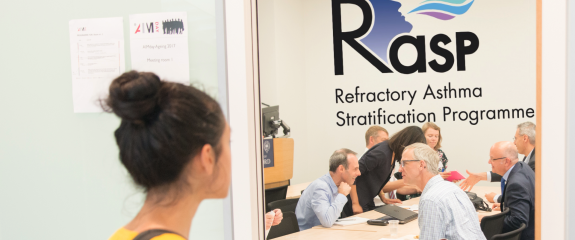Reducing Steroids in Severe Asthman: a Novel Biomarker Driven Strategy

Researchers have identified what appears to be a safe and effective means of reducing unnecessary exposure to corticosteroids in patients with severe asthma according to results recently published in The Lancet, Respiratory Medicine [1].
Conventional recommendations in asthma advocate increasing corticosteroid dose to manage symptoms and reduce exacerbations. Those with severe asthma often progress to high doses of steroids. This puts some patients, namely those not having corticosteroid responsive type-2 (T2)-driven eosinophilic inflammation, at risk of unnecessary exposure to high dose corticosteroids.
The team compared a composite biomarker score driven approach to adjusting corticosteroid dose with traditional symptom-based treatment in over 300 severe asthmatics from across the UK.
With a primary endpoint of the proportion achieving corticosteroid dose reduction at Week 48, the statistical power of the study was challenged by the reluctance of patients in both treatment groups to follow advice to reduce their corticosteroid dose, which was very different across clinical centres. In interview, the lead investigator Professor Liam G. Heaney (Queen’s University, Belfast) said “Understanding the reasons for this reluctance to follow treatment advice is an important area for future research.”
Patients attended clinic every 8 weeks and their treatment was adjusted following automated treatment-group-specific algorithms. Those in the biomarker group received an advisory to maintain treatment, and patients in the control group had their treatment adjusted according to the algorithm. In the intention to treat population, 28.4% of patients in the biomarker group were receiving a lower corticosteroid dose compared with 18.5% of patients in the control group at Week 48 (not significantly different), however statistical significance was achieved in those patients that followed the study protocol including treatment advice (30.7% vs. 5% respectively; P < 0.05). Secondary outcomes included inhaled corticosteroid dose at the study conclusion and cumulative dose during the study, number of patients on maintenance oral corticosteroids at the study conclusion, rate of annual severe asthma exacerbations, time to first severe exacerbation, number of asthma hospital admissions and lung function changes. Researchers observed no difference in secondary outcomes between both groups and no loss of asthma control among those in the biomarker group who reduced corticosteroid dose.
The multimillion-pound, part MRC-funded, part Industry-funded study conducted across UK centres of asthma treatment excellence was supported by leading partners from industry who together formed the Refractory Asthma Stratification Programme (RASP-UK) consortium. Professor Heaney notes, “We suggest that before progression to high-dose inhaled and systemic corticosteroid treatment, predictive biomarkers of therapeutic response should be assessed because, once established on high dose treatment, there are challenges in reducing a patient’s treatment.
1. Heaney LG Busby J Hanratty CE et al. Composite type-2 biomarker strategy versus a symptom–risk-based algorithm to adjust corticosteroid dose in patients with severe asthma: a multicentre, single-blind, parallel group, randomised controlled trial. Lancet Respir Med. 2020; (published online Sept 8.) https://doi.org/10.1016/S2213-2600(20)30397-0


